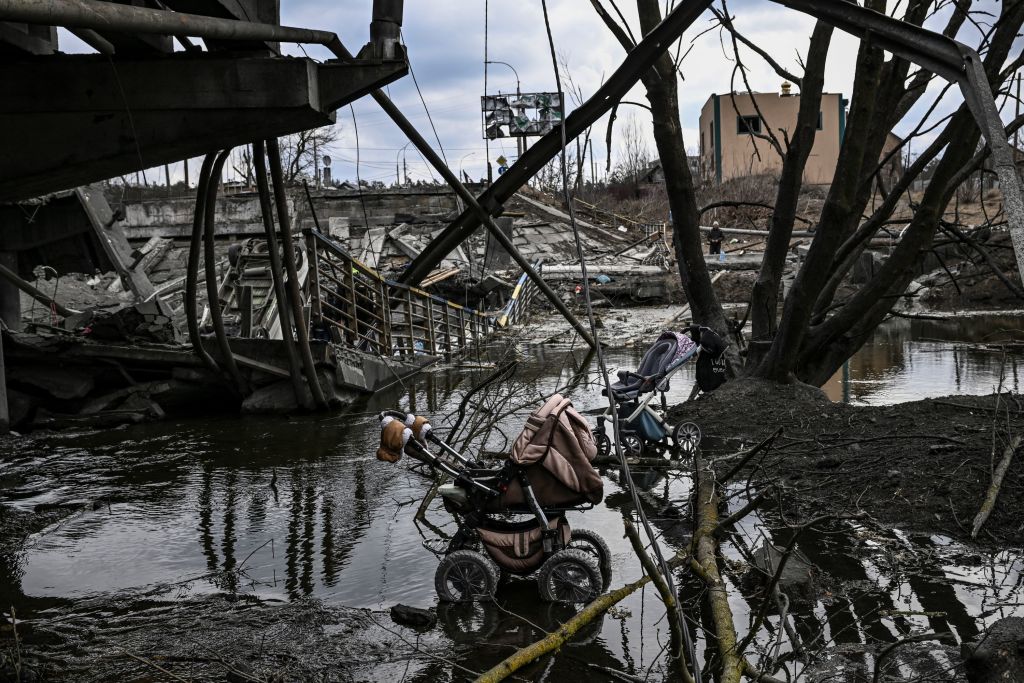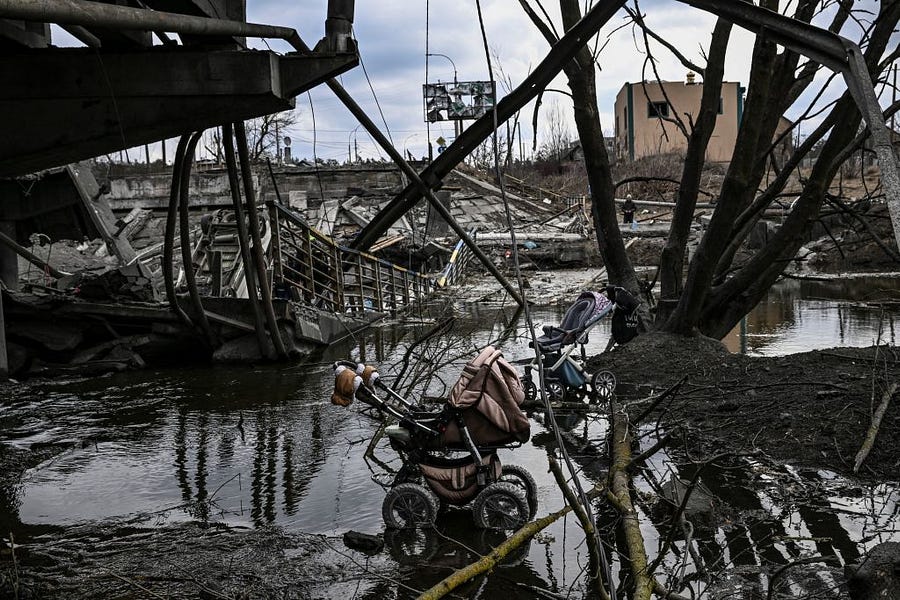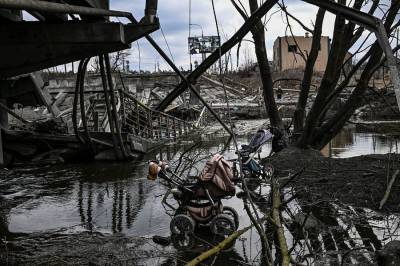Happy Thursday! We were going to start off today with another crack about Chicago sports, but instead we’ll just get to the news.
Quick Hits: Today’s Top Stories
The State Department formally determined that Russian forces are perpetrating war crimes in Ukraine. “We’ve seen numerous credible reports of indiscriminate attacks and attacks deliberately targeting civilians, as well as other atrocities,” Secretary of State Antony Blinken said in a statement on Wednesday. “Russia’s forces have destroyed apartment buildings, schools, hospitals, critical infrastructure, civilian vehicles, shopping centers, and ambulances, leaving thousands of innocent civilians killed or wounded.”
Madeleine Albright—former secretary of state, the first woman to hold that distinction, and U.S. ambassador to the U.N.—died of cancer on Wednesday at the age of 84.
NATO Secretary General Jens Stoltenberg announced the creation of four new battlegroups in its eastern flank nations of Bulgaria, Romania, Slovakia, and Hungary. The news came ahead of President Joe Biden’s meeting with other alliance leaders today in Brussels. While there, the president is expected to discuss plans for additional sanctions targeting Russia and defensive aid to Ukraine.
A senior NATO military official assessed Wednesday that between 7,000 and 15,000 Russian troops had been killed in Moscow’s month-long invasion of Ukraine.
The Department of Defense told reporters Wednesday that Ukraine drove back Russian forces to roughly 55 kilometers outside Kyiv, further stalling the slow-moving Russian advances from the northeast and east.
Idaho Gov. Brad Little signed into law a statute banning abortions after six weeks of pregnancy, making his state the first to institute legislation based on a Texas law that the Texas Supreme Court declined to block earlier this month.
A coalition of major airlines called for an end to COVID-era travel policies like the federal mask mandate and a COVID test requirement for international travel in a letter to the Biden administration Wednesday. “The persistent and steady decline of hospitalization and death rates are the most compelling indicators that our country is well protected against severe disease from COVID-19,” the letter said.
Russia’s Invasion Turns to War of Attrition

One month into Russia’s invasion of Ukraine, it’s clear that Vladimir Putin’s initial plan for the war—a swift, overwhelming assault culminating in the capture of Kyiv, the toppling of the government, and installation of a puppet state—has failed. The advance of Russian ground forces into Ukraine from the north, south, and east has ground to a virtual halt in recent weeks. Attempts by Russian forces to encircle Kyiv have so far failed, and Russia has not yet been able to establish air superiority over Ukraine. And Russian casualties are mounting—between 3,000 and 10,000 deaths so far, according to U.S. and NATO estimates (greater than 15,000, according to Ukraine).
“If we are not in a stalemate already, we are rapidly approaching one,” a senior NATO intelligence official told reporters in a briefing this week. “And it’s quite a thing to say when you consider the disparity in strength when this fight began.”
To have frustrated the Russian advance to such an extent is, of course, a remarkable testament to the courage of the Ukrainian people and the herculean leadership of President Volodymyr Zelensky’s government. But the unfortunate reality is that stalemate likely means an awful amount of bloodshed and suffering ahead, for both sides’ armies and for Ukraine’s civilians.
While Ukraine has had one or two territorial victories of its own—the country’s Defense Ministry said its forces retook the Kyiv suburb of Makariv on Tuesday—for now the best they can do overall is prevent Russia from advancing farther. And with both sides seeming unlikely to blink anytime soon, that means a brutal war of attrition is beginning, with both sides slugging each other indefinitely in the hope of crushing their opponent’s spirit so thoroughly it becomes impossible to continue.
It's no secret, of course, that the Russian invading force is in pretty bad shape, both physically and mentally—not surprising, given the frigid conditions and the fact that few of them seem to have known they were being shipped out for brutal trench warfare in Ukraine. The Russian advance has been further harmed by shambolic logistical support, with Russian units regularly running short on gas for their vehicles and food for their soldiers. Pentagon press secretary John Kirby told reporters Wednesday that the Russians “either didn’t properly plan for logistics and sustainment or they didn’t properly execute to their plan, but they are still having problems.”
“The Ukrainians have been very adept at attacking their logistics,” Eric Edelman, the U.S. ambassador to Turkey under President George W. Bush, told The Dispatch. “They’ve been hitting these convoys of trucks—in particular fuel trucks with these drones, which give you, you know, secondary explosions—you get a lot of bonus points, right, when you hit those. There’s the old saw in military affairs that amateurs talk about strategy, but professionals talk about logistics.”
But a Russian army that’s starting to feel desperate isn’t good news for the millions of Ukrainian civilians still in combat zones. The U.S. assesses that nearly 5,000 civilians have died in Ukraine, where Russia has hit apartment buildings, schools, and hospitals in increasingly indiscriminate shelling. On Wednesday, the State Department assessed that this campaign amounted to war crimes by the Russians.
“It’s clear that they’re getting more hardened, more brutal, and seeing everyone including civilians as an enemy that needs to be destroyed,” Dmitri Alperovitch, the Russian-born co-founder of the Silverado Policy Accelerator, told The Dispatch. “And that really is problematic in terms of additional brutality that the Ukrainian civilians are likely to experience going forward from the Russian troops.”
Nowhere is this truer than in Mariupol, the southern port city that has been surrounded and besieged by Russian forces for weeks. Once a city of 450,000, Mariupol has seen near-constant shelling since the siege began, which the city council this week said had reduced it to the “ashes of a dead land.” Russia has at turns refused to permit civilian evacuations to the west and, when evacuations have been permitted, broken ceasefires and shelled evacuation corridors. As a result, Zelensky said this week, more than 100,000 Ukrainians are still trapped inside, unreachable even by humanitarian organizations, which Russia has prevented from entering the city. It’s a starvation siege, plain and simple.
President Joe Biden is traveling in Europe this week, meeting with foreign leaders to coordinate still more punitive economic measures against Russia and its elites. Biden is expected to announce new sanctions against members of Russia’s lower legislative body but kept his message close to the chest as he boarded Air Force One Wednesday: “All I have to say, I’m going to say it when I get there.” The president is scheduled to hold a press conference this afternoon.
It's possible this visit will presage some explosive economic change, like a European embargo on Russian oil. Short of that, though, Putin likely already has the economic damage of sanctions priced into his war. The likeliest outcome remains that Ukraine will have to hunker down for a long, punishing slog.
“The reality is that the longer the war goes on, the more territory the Russians are able to conquer, the less likely they’ll be willing to give it up,” Alperovitch said. “And of course Zelensky will be highly unlikely to sign away territory that Russia has captured in the war, even in exchange for a peace settlement. So as a result this war is likely to continue grinding away for a very long time—months, could be even years.”
Same Song, Next Verse in Jackson Hearing
In Washington, D.C., you often hear people clamoring to “make politics boring again.” Sen. Michael Bennet even used that idea while running for president.
It didn’t work for Sen. Bennet, but being boring has a high chance of working for Judge Ketanji Brown Jackson in her quest to be confirmed to the Supreme Court.
At 9 a.m. Wednesday in a Hart Senate Office Building hearing room, Jackson and senators began the third day of her confirmation hearings. The results were, well, largely boring.
The biggest piece of news from the day’s proceedings was Jackson saying she would recuse herself from an affirmative action case that the court will hear next term involving Harvard’s admissions policy. Jackson has served on the Harvard Board of Overseers for the last six years.
Beyond that, the day looked a lot like the day before.
Most of the day’s fireworks came from Republicans—chief among them Sens. Lindsey Graham and Ted Cruz—zeroing in on Jackson’s sentencing in child pornography cases.
Cruz asked Judge Jackson repeatedly to justify her decision on particular child pornography cases. Jackson gave a very similar answer to what she has given in the past: “I have spoken at length throughout this hearing about these cases. I’ve said what I’m going to say, which is, I’ve taken every case seriously. These are very horrible crimes.”
After even more attempts to get her to say more, Cruz ran out of time, which prompted a heated back-and-forth between him and Judiciary Committee Chair Dick Durbin. “I know you like to interrupt,” Cruz snapped as Durbin attempted to move on to the next senator. “I know you don’t like this line of questions.”
After even more attempts to get Jackson to say more on her reasoning behind certain sentences, she settled on an answer she stuck with when asked about the sentencing: “Senator, I’ve answered this question many times from many senators who have asked me. So I’ll stand on what I’ve already said.”
As the hearing rolled on, 10 of the 11 Republicans on the committee signed and submitted a letter to Durbin asking to see probation office recommendation reports for Jackson’s cases as a judge. (Sen. Ben Sasse was the only one not to sign.) Doing so would be the first time such reports would ever be considered by the committee.
Durbin cautioned against releasing some of the pre-sentence reports requested in the letter. “They can contain highly sensitive personal information, not just about the defendant, but about innocent third parties and victims,” he said. “I would not want it weighing on my conscience that we are turning over these presentence reports to this committee for the first time in history and that information out of this or because it was released would somehow compromise or endanger any victim as a result of it.”
Sen. Mike Lee said that to protect victims’ privacy senators could view redacted versions of the reports.
The final day of the hearing begins today at 9 a.m., and the committee will hear from over a dozen witnesses in support of Jackson.
Worth Your Time
If history rhymes, 2022 sure sounds a lot like 1979. John Podhoretz’s latest in Commentary gives a history of the rise of neoconservatism in the 20th century, beginning with the Soviet Union’s 1979 invasion of Afghanistan. But the preferred neoconservative strategy of deterrence fell out of vogue throughout this century, Podhoretz argues, and the consequences—a disastrous withdrawal from Afghanistan and a Russian invasion of Ukraine—are now clear. “If the greatest threat to our liberty abroad from the end of World War II until the end of the Cold War was the Soviet Union, the best and only effective way to face it down was to work to deter its ambitions and its influence. You could not do so by entering into agreements with it. You needed to match its aggressions with countermeasures that would make those aggressions costly,” he writes. “Deterrence is what America lost in the years before Vladimir Putin took the gamble of going into Ukraine, and it is deterrence we need to restore. That is why this is a neoneoconservative moment.”
Why is Putin unleashing total destruction on a predominantly Russian-speaking city in a war he started ostensibly to liberate culturally Russian Ukrainians? Eric Levitz offers a good run-down on Mariupol’s strategic, economic, and symbolic significance to Moscow in Intelligencer. One big factor, Levitz explains, is geographical: “If Russia can secure control of the city and its surrounding area, it can construct a ‘land bridge’ between its two major strongholds in Ukraine. This would aid subsequent military efforts to press deeper into Ukrainian territory and immediately establish a continuous line of Russian-dominated land in Ukraine, which could form the outline of a hefty consolation prize for Putin.”
After making concession after concession to Iranian negotiators in Vienna, the Biden team looks poised to revive the Obama-era Iran nuclear deal. But the actual shape of the agreement remains a mystery. In a recent guest piece for the Washington Post, John Bolton—national security advisor under President Donald Trump—criticizes the current administration’s lack of transparency and calls on the Senate to exercise its constitutional oversight role. “By not sending the deal to the Senate, Biden would flout its treaty role. If that happens, the Senate should use its constitutional power to withhold advice and consent on all presidential nominees, both executive and judicial, until Biden changes his mind,” Bolton writes. “Such a move by the Senate would focus attention on substantive flaws in the resurrected nuclear deal and their dangers for future presidents and the country generally. Article II’s supermajority requirement for treaty-making reflects the Framers’ firm belief that treaties are exceptional steps for the United States, very different from ordinary legislation.”
Presented Without Comment
Toeing the Company Line
In Wednesday’s G-File, Jonah expounds on a topic he’s written about time and time again: liberal media bias. “Too much of the media—on the left and the right—is about doing party work by proxy,” Jonah writes. This is particularly a problem among liberal journalists, who, by virtue of their monopoly on mainstream outlets, often blur the line between reporting and operating as the de facto campaign atm of the Democratic Party. But what many mainstream journalists lose sight of, Jonah argues, is the fact that their partisan approach to reporting helps Republicans more often than not. In Jonah’s words: “If liberal journalists wanted to help Democrats, they would work tirelessly to police their extremists, curb their flights of fantasy, and apply their journalistic skepticism less to the stuff—and the people—they hate and more to the people they like or feel allied with.”
Do you ever sit down and think about how much your non-working time is worth? What about when you’re waiting in line for gas or groceries? Turns out there are some economic principles that can help us approach our daily routines in a more cost and time-efficient manner. Read Scott Lincicome’s latest Capitolism newsletter, where explains talks about opportunity cost, the economic principle “that gets little attention in Washington yet should inform our thinking on not only personal line-waiting protocols but also public policy.”
For more on Ukraine, tune into the latest Dispatch Podcast, which features Steve talking with Taras Byk, a political consultant now working with the Territorial Defense Forces in Kyiv, and Tom Karako, a senior fellow at the Center for Strategic and International Studies.
Let Us Know
If the conflict in Ukraine does drag out for months or years, how do you see that affecting international support for Ukraine’s plight? Will international allies stay united in the face of Russia’s aggression, or will the attention of the public drift on to the next thing?
Reporting by Andrew Egger (@EggerDC), Ryan Brown (@RyanP_Brown), and Steve Hayes (@stephenfhayes).







Please note that we at The Dispatch hold ourselves, our work, and our commenters to a higher standard than other places on the internet. We welcome comments that foster genuine debate or discussion—including comments critical of us or our work—but responses that include ad hominem attacks on fellow Dispatch members or are intended to stoke fear and anger may be moderated.
With your membership, you only have the ability to comment on The Morning Dispatch articles. Consider upgrading to join the conversation everywhere.